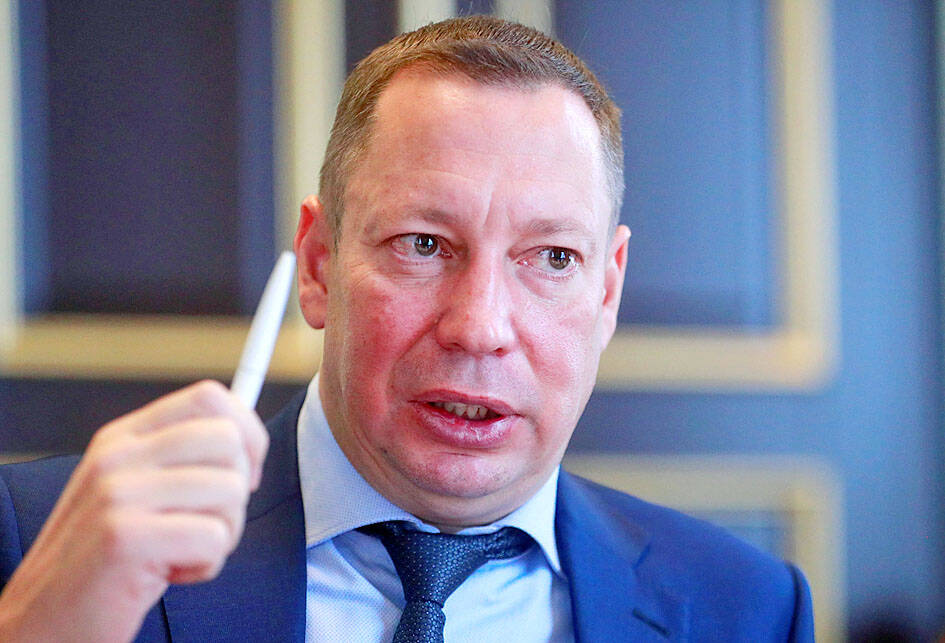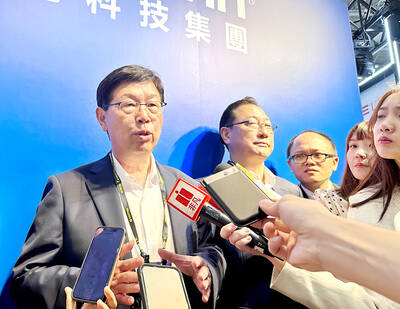Ukrainian central bank Governor Kyrylo Shevchenko unexpectedly resigned, citing health reasons as the nation battles to fend off Russia’s invasion and stabilize an economy devastated by war.
Shevchenko submitted his resignation letter to Ukrainian President Volodymyr Zelenskiy, a statement posted on the central bank’s Web site on Tuesday said. His departure is subject to approval by parliament. Once the assembly accepts it, his first deputy, Kateryna Rozhkova, would take over as the acting governor, the bank’s press office said.
“Due to health-related reasons, which I cannot continue to ignore, I made a difficult decision for myself,” Shevchenko said in the statement.

Photo: Reuters
Until his resignation is processed, Shevchenko said the central bank board would “continue to perform its functions and manage the activities of the National Bank in its current composition.”
His departure comes as IMF officials prepare to assess the nation’s financial needs later this month. Ukraine is seeking a large-scale loan program from the lender apart from US$1.3 billion in a single unconditional disbursement the IMF is already considering.
“It’s not a tragedy for the National Bank of Ukraine, as Shevchenko hasn’t proven himself in this post, though it’s worth paying tribute to him for not yielding the central bank’s independence,” said Oleksandr Parashchiy, research director at Kyiv-based Concorde Capital.
A new governor might be appointed quickly given the president’s backing in parliament, he said.
Parliament is to debate Shevchenko’s resignation today, lawmaker from the president’s Servant of the People party Andriy Gerus said by telephone.
The bank hiked interest rates to 25 percent in June, citing the “shift in the fundamental parameters” of the nation’s economy during the war. It also had to devalue the hryvnia, calling it a 25 percent correction, in July to protect its foreign-currency reserves.
The bank has flagged a pause in monetary tightening until at least the second quarter of 2024 as long as the impact of war on the economy does not deviate from their expectations.
Ukraine was forced to ask investors to defer all payments due under its sovereign eurobonds for a period of 24 months and to amend the payment terms on its GDP-linked securities.
The 49-year-old Shevchenko has led the central bank since July 2020, and was criticized by Zelenskiy and the IMF in the early days of his tenure after the loss of key staff from the central bank. The barbs eased after Russia invaded on Feb. 24, as the monetary authority has played a key role in supporting the wartime economy.
His predecessor, Yakiv Smoliy, also unexpectedly quit in the middle of 2020, citing political pressure to lower interest rates.
Devastated by Russia’s invasion eight months ago, the Ukrainian economy would plunge 35 percent this year, the World Bank forecast on Tuesday.
The war has destroyed factories and farmland, and displaced millions of Ukrainians. The World Bank, a 189-country anti-poverty agency, estimates that rebuilding the country would cost at least US$349 billion, 1.5 times the size of Ukraine’s pre-war economy.
“Ukraine continues to need enormous financial support as the war needlessly rages on, as well as for recovery and reconstruction projects,” said Anna Bjerde, World Bank vice president for Europe and Central Asia.
Still, the bank’s assessment for Ukraine’s economy marks an upgrade from the 45.1 percent freefall it forecast in June. It also expects that the Ukrainian economy would return to growth next year, expanding 3.3 percent — although the outlook is highly uncertain and would depend on the course of the war.
Additional reporting by AP

Taiwan Transport and Storage Corp (TTS, 台灣通運倉儲) yesterday unveiled its first electric tractor unit — manufactured by Volvo Trucks — in a ceremony in Taipei, and said the unit would soon be used to transport cement produced by Taiwan Cement Corp (TCC, 台灣水泥). Both TTS and TCC belong to TCC International Holdings Ltd (台泥國際集團). With the electric tractor unit, the Taipei-based cement firm would become the first in Taiwan to use electric vehicles to transport construction materials. TTS chairman Koo Kung-yi (辜公怡), Volvo Trucks vice president of sales and marketing Johan Selven, TCC president Roman Cheng (程耀輝) and Taikoo Motors Group

Among the rows of vibrators, rubber torsos and leather harnesses at a Chinese sex toys exhibition in Shanghai this weekend, the beginnings of an artificial intelligence (AI)-driven shift in the industry quietly pulsed. China manufactures about 70 percent of the world’s sex toys, most of it the “hardware” on display at the fair — whether that be technicolor tentacled dildos or hyper-realistic personalized silicone dolls. Yet smart toys have been rising in popularity for some time. Many major European and US brands already offer tech-enhanced products that can enable long-distance love, monitor well-being and even bring people one step closer to

RECORD-BREAKING: TSMC’s net profit last quarter beat market expectations by expanding 8.9% and it was the best first-quarter profit in the chipmaker’s history Taiwan Semiconductor Manufacturing Co (TSMC, 台積電), which counts Nvidia Corp as a key customer, yesterday said that artificial intelligence (AI) server chip revenue is set to more than double this year from last year amid rising demand. The chipmaker expects the growth momentum to continue in the next five years with an annual compound growth rate of 50 percent, TSMC chief executive officer C.C. Wei (魏哲家) told investors yesterday. By 2028, AI chips’ contribution to revenue would climb to about 20 percent from a percentage in the low teens, Wei said. “Almost all the AI innovators are working with TSMC to address the

FUTURE PLANS: Although the electric vehicle market is getting more competitive, Hon Hai would stick to its goal of seizing a 5 percent share globally, Young Liu said Hon Hai Precision Industry Co (鴻海精密), a major iPhone assembler and supplier of artificial intelligence (AI) servers powered by Nvidia Corp’s chips, yesterday said it has introduced a rotating chief executive structure as part of the company’s efforts to cultivate future leaders and to enhance corporate governance. The 50-year-old contract electronics maker reported sizable revenue of NT$6.16 trillion (US$189.67 billion) last year. Hon Hai, also known as Foxconn Technology Group (富士康科技集團), has been under the control of one man almost since its inception. A rotating CEO system is a rarity among Taiwanese businesses. Hon Hai has given leaders of the company’s six